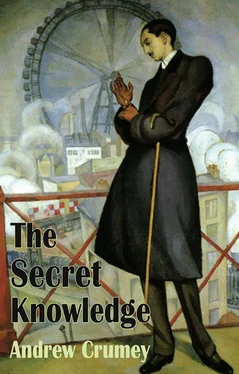“What happened to Laura?”
“She never existed.”
“Then why do I remember?”
“Mistakes happen.” H smiles, crumples the thin chain in his fist and returns it to his pocket. “What if Beethoven’s letter hadn’t arrived at the publisher’s in time, and the extra bar wasn’t added? Would anyone notice? If things had gone a little differently, might we now rate Spohr over Schubert, or Hummel over Mendelssohn? If history could be altered…”
“It can’t.”
“Think of any piece you play: a fixed score, yet every performance is unique. Physical reality is like the score, existing outside of time. History is performance.” H reaches again into his pocket and brings out something else that Conroy recognises.
“The old lady’s cards. You broke in and took them.”
H shuffles the deck without comment, then fans them, just as the lady did, and holds them out, face-down, for Conroy to make his selection.
“Why should I play this game, you’ve already made the choice for me.”
H appears amused, even pleased. “A performer knows all about the tricks of persuasion. Yes, the game was rigged, you were always meant to lose, but go on, take a card, see what you get.”
Conroy places his finger on one then immediately changes his mind and touches another.
“Are you sure?” H asks.
Conroy opts for a third, pulls the card from the man’s grip and turns it to see the picture. A corpse dangling in a gibbet. “Suicide,” he murmurs, reading the legend.
“What Klauer did and didn’t do. The thing every artist yearns for.”
“Death?”
H shakes his head. “Immortality. Forever sacrificing yourself, yet surviving.”
“This was always about Klauer.”
“It’s about what he stole.”
Theodor Adorno wakes, rolls and sees Ulrike still asleep beside him, pale shoulder studded with fine freckles. Late afternoon sunshine filters through the thin curtains of her apartment, it’s in one of Frankfurt’s noisier suburbs, swelled by immigrants and perpetually permeated, it seems, by amplified music. Teddie must be home before seven.
Praxis is the ensemble of means for minimising material necessity. It therefore becomes identical with pleasure. Yet pleasure is denied within a society that asserts only rational practicality. Being married and sixty-four years old shouldn’t stop a man fucking his student. Ulrike appreciates the hermetic character of play. Her record collection includes only the latest rock-and-roll releases, nevertheless her non-compulsory attendance at his course on advanced dialectics has indicated to him acute awareness of the fundamental contradiction those commodities represent. Sex, too, can be understood negatively. That he is not with his wife should not imply infidelity. He has never kept secrets from Gretel, except when too nugatory to be worth mentioning.
Lying with her back to him, Ulrike’s short brown hair leaves naked and exposed the vertebrae of her neck. Teddie traces the undulating ridge with his finger, she stirs and sighs, suddenly conscious of comfort, warmth, intrusion.
“I have to go,” he says.
“Mmm.”
She doesn’t turn; her acceptance, which is rejection, disappoints him. Instead of leaving the bed as he ought, he gazes at the ceiling, noting its hairline cracks and peeling paint. One day Ulrike will be a philosophy lecturer, as he is now. At least that’s the dream, though he doubts she’s up to it.
She becomes fully awake. “Want some coffee?” she asks, sitting up and reaching for her cigarettes and lighter. Teddie doesn’t care either way. He answers a different question.
“Tomorrow would have been Walter Benjamin’s seventy-fifth birthday.” Even as he says it, the future conditional evokes an inescapable antinomy. “There’s a symposium at the university.”
“I know.”
“Will you come?”
“Do you want me to?”
“I’m to be the main speaker.”
“Will Gretel be there?”
“It doesn’t matter. I don’t think so.”
Ulrike breathes blue smoke into the static air. “Sure, I’ll come.”
Just how little truth converges with subjective idea, with intention, is evident to the most rudimentary consideration. Benjamin’s dictum — the paradox of beauty is that it appears — is less enigmatic than it sounds.
“What’ll you say?” she asks.
“Obviously I won’t offer an hommage or appreciation. That would be vulgar.”
She gets up, standing thin and naked in thought beside the bed. Her breasts are small, there is something almost emaciated about her appearance, yet youthful, defiant. She could be contemplating her own execution. She picks up some underwear, pulls a shirt over her head, begins to walk away. “What if there’s another protest?” She peeks through the curtains at whatever isn’t happening in the void outside.
“I’m sure there won’t be.”
“The movement’s gaining support.”
“Its motives are compromised.”
At a recent seminar a group of students came and stood in front of the lectern, completely blocking Adorno’s view of the audience. One of them read a series of pledges and demands ranging from solidarity with the people of Vietnam to complaints about the university cafeteria, then there was an open discussion about the meaning of political action in which Adorno took no part.
“They won’t disrupt the symposium,” he says. “Not given the sort of saintly figure Benjamin has become.”
She turns. “You sound almost jealous.”
Ulrike’s swinging rump departs to the kitchen while Teddie remains prostrate, wondering if there will be coffee or even further sex before he goes. Of course he isn’t jealous. His position in the Institute makes him custodian of the Benjamin archive, while his work on the same questions his late friend confronted, his duty to correct error, becomes easily equated in some minds with the false notion of legacy. All that is least essential in a philosopher can be summarised under the heading “biography”. Hence the snide attacks and mischief-making of people like Arendt. What matters to them is not truth-content, but the preservation of a dead man’s every sacred word, even the wrong ones. That is touching but misguided. Were Walter Benjamin alive today, thinks Teddie, he would have destroyed and rewritten a large proportion of the texts for which he is celebrated. He would have cared little for the birthday festivities planned in his honour.
He hears the water hiss and begin to boil. He knows he has never been handsome or attractive in the reified sense of movie actors; but there will always be discerning women for whom a discourse on Hegel is more seductive than a bunch of flowers. Ulrike is able to see beneath the social superstructure; he has taught her how. She comes back holding a striped mug in her hand. “I’ve never thought to ask you, Teddie. When’s your birthday?”
“September eleven.”
She sips, pauses. “That’s a long way off.”
“You don’t think we’ll be together then?”
“I mean, it’s still only July.”
No coffee, no sex. When Teddie gets home he finds his wife has already left for the theatre alone. He needs to prepare for the symposium. He should like to say something about Benjamin’s position on Heidegger; Teddie has discussed his own in his most recent book, Negative Dialectics . The first edition has already sold out, a new one is being printed. Everyone has an opinion about it, even if they don’t understand it, which is the majority position. Adorno is accused of obscurity, jargon-mongering, the very things he opposes. When the world is discussed in the clearest possible terms it becomes infinitely opaque. Are there existing things that cannot be considered concepts? A clear enough question, surely. That phoney Heidegger merely ontologises the pre-existing; Walter saw clearly enough the fascism already implicit in Heidegger’s return to the mythological.
Читать дальше











